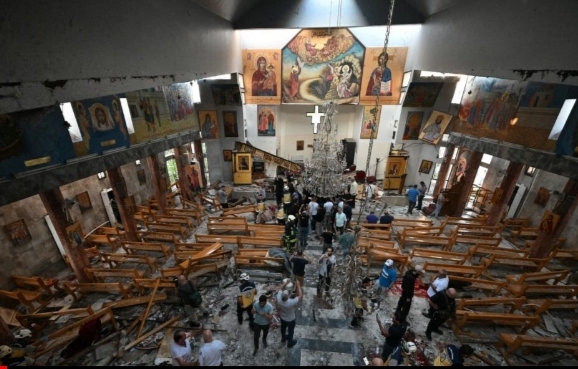World
Suicide bomber attacks Damascus church, kill 20 worshippers

A suicide attack on a Damascus church on Sunday left at least 20 people dead and dozens wounded, according to Syrian authorities, who blamed the Islamic State group for the deadly assault.
The bombing, which struck Saint Elias Church in the capital’s Dwelaa district, is the first such incident targeting a church since Syria’s civil war began in 2011, and the first major blast in Damascus since Islamist forces ousted former president Bashar al-Assad in December.
“This heinous crime” drew swift condemnation from the United Nations. UN special envoy for Syria Geir Pedersen called for “a full investigation and action by the authorities.”
According to the interior ministry, “a suicide attacker affiliated with the Daesh (IS) terrorist group entered the Saint Elias church in the Dwelaa area of the capital Damascus where he opened fire then blew himself up with an explosive belt”.
AFP reporters on the ground saw emergency teams evacuating the wounded from the scene, where shattered wood, broken pews, fallen icons, and pools of blood littered the floor. Security forces quickly sealed off the area.
The Syrian health ministry, via the state-run SANA news agency, confirmed that 20 people were killed and 52 others injured, updating an earlier toll provided by civil defense teams.
Eyewitness Lawrence Maamari described the horrifying moment to AFP: “Someone entered (the church) from outside carrying a weapon” and began shooting. He said people “tried to stop him before he blew himself up”.
Another witness, who requested anonymity, said the blast caused chaos and panic among worshippers, including children and the elderly.
Ziad, a shopkeeper nearby, said: “We saw fire in the church and the remains of wooden benches thrown all the way to the entrance,” adding that he heard gunfire followed by an explosion and saw glass flying toward him.
France also condemned the assault, denouncing it as an “abject, terrorist” act and reaffirming support for a peaceful and inclusive transition in Syria where all communities can live in “a free, united, pluralistic, prosperous, stable and sovereign” nation.
The Syrian foreign ministry labeled the bombing “a desperate attempt to undermine national coexistence and to destabilise the country”.
The tragedy has left families searching frantically for missing loved ones, as rescue operations and identification of victims continued into the night.
Interior Minister Anas Khattab extended his condolences and said that “specialised teams from the ministry have begun investigations into the circumstances of this reprehensible crime.” He added: “These terrorist acts will not stop the efforts of the Syrian state in achieving civil peace.”
In an interview earlier this month, Khattab warned of heightened security threats, stating that IS had shifted to “studied attacks on strategic targets” and had attempted “to carry out attacks against the Christian and Shiite community” — plots which the authorities had previously managed to foil.
Just last month, the group claimed responsibility for its first attack on Syria’s new ruling forces. Syrian security officials also reported dismantling an IS cell near Damascus and killing three members of the group in Aleppo during a separate operation.
While the Islamic State lost control of its so-called caliphate following military defeats by U.S.-backed Kurdish forces in 2019, remnants of the jihadist group continue to operate in Syria, especially in remote desert regions.
(AFP)


























